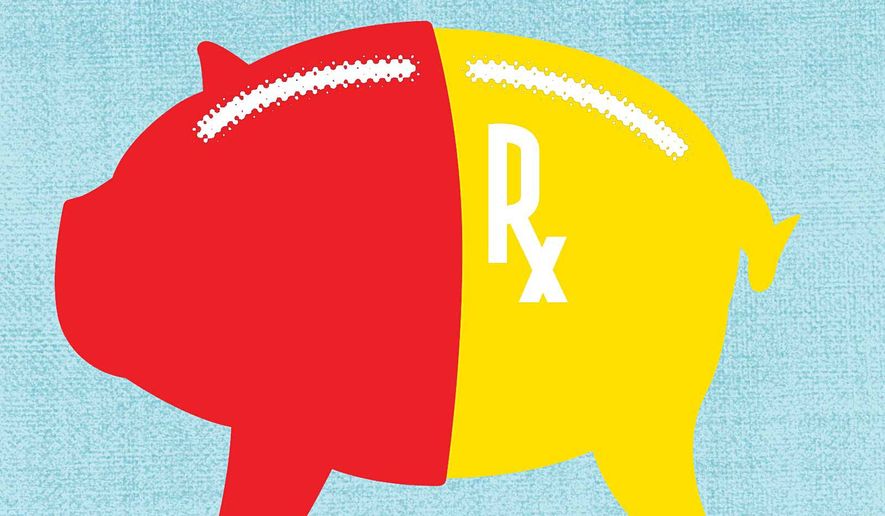OPINION:
When Congress subpoenaed the controversial financier Martin Shkreli to testify about pharmaceutical pricing this month, it should have been no surprise that the hearing shed more heat than light on an important, yet divisive issue.
Mr. Shkreli, unsurprisingly, plead the 5th and then proceeded to not only mock the seriousness of the issue, but call the House committee members “imbeciles”
If members of Congress are sincere in their call to thoughtfully consider drug pricing, they should acknowledge that Mr. Shkreli and his unorthodox approach to pharmaceuticals are an anomaly (in every sense of the word).
While Mr. Shkreli’s theatrics garnered the media circus, a more erudite debate on drug pricing is fortunately taking shape in the upper body where Sen. Orrin Hatch, Utah Republican, and Sen. Elizabeth Warren, Massachusetts Democrat, present stark differences on how to tackle drug prices.
In a January hearing, Sen. Hatch queried Dr. Janet Woodcock, director of the Food and Drug Administrations’s Center for Drug Evaluation and Research, whether the agency’s backlog of some 3,500 lower-cost generic drugs awaiting approval was contributing to the cost consumers (including governments) pay for drugs.
Dr. Woodcock conceded that despite her division receiving a significant financial boost with the 2012 passage of the General Drug User Fee Amendments, slow-paced drug approvals contribute to high costs.
She’s right, and in a big way. Eighty-eight percent of all prescriptions in the U.S. are generics. If the FDA acted more quickly with both generics and new drugs, overall health costs would go down and patient health outcomes would improve.
By quickly approving generics, lower cost versions would be available without unfairly infringing on profits (and thus stifling innovation) that pharmaceutical companies need to recoup the high costs to bring new drugs to market. Remember, the vast majority of potential new medicines in the privately-funded pipelines never see the inside of a drugstore. To fund what is by nature speculative research, the drugs that do come to market must provide potential for profit to attract investors.
Along the same lines, if the FDA can maintain safety and efficacy standards while reducing the time and money it takes to get a new drug approved, prices would fall as well.
Yet Ms. Warren and certain presidential candidates on both sides of the aisle are casting the innovative pharmaceutical industry as an enemy, rather than a partner of improved and affordable health care. Ms. Warren argues that the effort to expand access to generic medicine by prodding the FDA to be more efficient is just a sideshow.
“Let’s not kid ourselves real change will require us to face the fact that the market for prescription drugs is not working,” Ms. Warren said at the hearing. She’d like us to believe that Mr. Shkreli is representative of the broader industry and only government price controls can protect consumers from what appear to be an ever-rising cost of drugs.
But is the market system truly broken, as she contends? Consider Sovaldi, the Gilead Sciences drug which cures most cases of Hepatitis C. The drug, which costs an eye-popping $84,000 for the standard 12 week, 84 pill treatment is a favorite target of those who indignantly proclaim that drugs, at a thousand dollars a pill, are simply “too expensive.”
Yet health care economists and researchers, including Hepatitis C expert Jeremy Goldhaber-Fiebert of Stanford University will tell you that in the scheme of things, the drug is a bargain.
In a study published in the Annals of Internal Medicine, Mr. Goldhaber-Fieber analyzed the overall costs of treating prison inmates with Hepatitis C. He found that while the short-term costs for Sovaldi treatment were higher than alternatives, over the long run, the drug offered real value because patients were generally cured, rather than just treated. Add in the benefit of actually curing the contagious disease and thus reducing societal spread, and this expensive drug becomes a public health economist’s dream, rather than nightmare.
At the recent House hearing, Rep. Stephen Lynch, Massachusetts Democrat, proposed what he amusingly called a “poison-pill amendment,” which would allow Congress to decide when drug prices are too high, and then just eliminate patent exclusivity and “contract with DARPA — our government research labs — to produce your drugs at no cost to the consumer. That’s what we can do.”
Mr. Lynch seems blissfully ignorant of the cost of developing new life and money-saving drugs like Sovaldi and anti-cholesterol drugs like Lipitor. He pretends that politicians could waive their magic wands and artificially lower drug prices. But in reality, doing so, like squeezing a balloon, will have consequences somewhere else — specifically on the innovative pipelines that rely on profits to fund necessary and often speculative research.
The Lynch and Warren approach will do one thing for sure. It will have a chilling effect on much needed private-sector investment in pharmaceutical research. And as Sovaldi and Lipitor are more representative of pharmaceuticals than Mr. Shkreli’s antics, the “market-failure, price control” argument would translate to higher overall treatment costs and a whole lot more human suffering.
• Jeff Stier is a senior fellow at the National Center for Public Policy Research in Washington, and heads its risk analysis division.




Please read our comment policy before commenting.